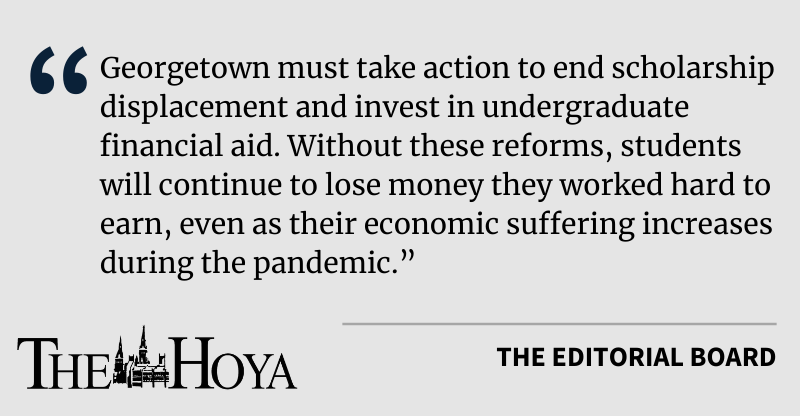No students — especially those from low-income backgrounds — should lose their hard-won scholarship money simply because their university won’t allow them to utilize it.
The editorial board calls on the Georgetown University Office of Student Financial Services to end its practice of scholarship displacement, under which Georgetown replaces previously offered institutional financial aid with the awards and benefits students receive from non-university sources. The cost of a Georgetown degree is an imposing barrier to many, even with financial assistance. Given the current economic and public health crisis, Georgetown should allow students to utilize all available resources to pay for their education.
Many U.S. universities have scholarship displacement policies. These rules allow universities to lower the financial aid they grant students who report receiving funding from an outside source. The implicit assumption in scholarship displacement is that a student’s demonstrated financial need decreases when they earn a third-party scholarship, allowing the university to decrease institutional, need-based aid. In the end, this process nullifies students’ outside awards and renders whatever effort they spent applying for scholarships futile.
At Georgetown, outside funding resources can reduce a student’s expected family contribution and eliminate loans or work-study, according to a university spokesperson. According to Sydney Gilbert (SFS ’23), who serves as the co-chair of the Georgetown University Student Association’s Socioeconomic Advocacy Team, outside scholarships initially decrease Georgetown’s own calculated EFC to what the Free Application for Student Financial Aid determines. Beyond this change, scholarships may reduce federal work-study awards or loan offers before lowering institutional grants.
This practice is unfair to students. Undergraduates work hard to earn outside awards — which typically include private merit-based scholarships, among other funding sources — and displacement significantly reduces their value. Students should have full access to the successes of their efforts, especially as they work to pay for a costly private education.
Moreover, displacement negates the entire purpose of these awards. Organizations generally grant scholarships with the intention of helping students and cannot accomplish this goal if universities respond by reducing institutional aid. Prominent scholarship organizations like the Dell Scholars and Gates Millennium Scholars Program have expressed serious concerns about the practice. Students have no incentive to apply for these resources in the first place, knowing they will lose need-based aid if they accept any outside funding.
By first reducing or eliminating FWS offers, which offer students federally subsidized employment opportunities, scholarship displacement also robs students of the opportunity to gain valuable work experience. These FWS positions benefit students beyond their financial aid and are preferable to other awards like loans, Eric Bazail-Eimil (SFS ’23), who has been an on-campus advocate for low-income students, wrote in an email to The Hoya.
“In my experience with outside scholarships, my Federal Work Study expectation has either been fully eliminated or significantly reduced, but I know that I would rather work and gain experience for my resume than take on more federal loans,” Bazail-Eimil wrote. The reduction of FWS assistance, put simply, hurts students who only want to support themselves financially.
The detrimental effects of scholarship displacement fall disproportionately on low-income students. Georgetown pledges to meet 100% of students’ demonstrated need through financial aid like grants and institutional scholarships, but students must account for whatever costs remain with their and their family’s resources. While the university’s scholarship displacement policy, which may nullify thousands of dollars of a students’ outside resources, will certainly hurt students across income ranges, the loss it inflicts on low-income students will be significantly higher compared to their income.
The idea of demonstrated need itself originates from university calculations based on student financial data. When this measure fails to accurately reflect a student’s financial reality, scholarship displacement severely limits their ability to pay for college, Gilbert wrote in an email to The Hoya.
“If this system worked perfectly, there would be no need for outside scholarships, so scholarship displacement would not have any effect on students,” Gilbert wrote. “The problems come when the calculated, demonstrated need does not align with the realities of a student’s situation. In those cases, a student may not be able to turn to outside scholarships for the full extent of the additional money they need because of this scholarship displacement, and instead has to rely on loans.”
Student frustration with scholarship displacement policies has already led to lawmakers’ prohibiting the practice in some parts of the United States. In 2017, after protests and advocacy by students and scholarship organizations, Maryland became the first state to ban public colleges and universities from offsetting external scholarships with reductions in need-based aid. Georgetown must take steps toward implementing the same policy.
Certainly, Georgetown doesn’t have unlimited resources to support student financial aid. Nor is eliminating scholarship displacement a complete solution to the barriers low-income students face. However, ending scholarship displacement is a strong first step toward a more fair system of financing undergraduate education and a policy change worthy of greater investment by student financial services. Especially during this time of heightened economic uncertainty amid the COVID-19 pandemic, students should be able to use whatever resources are available to them to fund their education.
Georgetown must take action to end scholarship displacement and invest in undergraduate financial aid. Without these reforms, students will continue to lose money they worked hard to earn, even as their economic suffering increases during the pandemic.
The Hoya’s editorial board is composed of six students and is chaired by the opinion editor. Editorials reflect only the beliefs of a majority of the board and are not representative of The Hoya or any individual member of the board.









